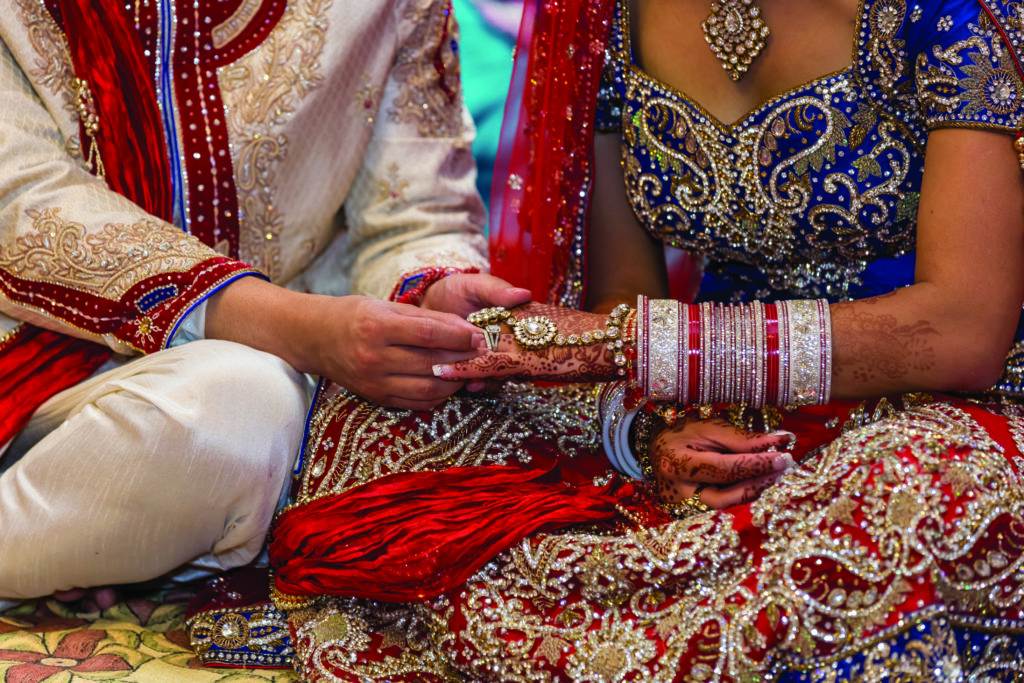The Ups and Downs of
Arranged Marriage
BY MALINI PATEL
What is love? Oh, did I wonder about this question when my mom invited my future husband to our house for dinner! I was 19—a carefree teenager. He did not come alone; his whole family turned up to inspect me. I was ill-prepared for this setup, being a virgin tomboy who had never kissed anyone. It came as a shock that overnight I was expected to marry and do it all.
I was the last of my mother’s three children still at home. She had been widowed in her forties and seemed desperate to shed the burden of her responsibility. Her search for a suitable Indian husband for me followed strict guidelines: He had to come from a good family, be an educated, property-owning professional, and, more importantly, be from our same caste and religion. Love was not in the equation; that was something that apparently ensued after marriage—or not.
Historically this parental control of marriage in India prevented intermixing between ethnic groups and castes. I had to pair with eligible bachelors from the “Patel” caste to maintain family alliances. Most traditional marriages are bond-like contracts wherein not just the bride and groom but also their whole families must preserve certain rights and responsibilities.
After our initial introduction I was allowed to go out with my future husband a few times while the family prepared the wedding. We went for several awkward dinners and talked only about trivial matters. We were both overwhelmed by the impending change. Our wedding had been announced, thus making it irreversible. Whatever incompatibilities revealed themselves during our meetings mattered not.
A few months later, 500-plus guests, including many from ancestral villages of Gujarat, India, gathered for our grand multi-day wedding ceremonies. For better or worse we were married. The expectation of us in this arrangement was that we would both act in good faith and make the best of it. A loving relationship could be expected to develop in due course.
Looking back at that day more than 25 years ago, I remain unsure as to which model of love is more successful, Eastern or Western. In Western romantic love both parties enjoy significant time to date, becoming physically intimate. They move in together and practice marital coexistence. The final plunge into marriage comes only after they pass this compatibility litmus test. Love and intimacy have time to mature and the exit option can be exercised if necessary. In Eastern culture, as I found out, it’s the opposite.

As I lived with my husband and his family, all of us in the same house, the concept of me as an individual was forcibly erased. I had grown up in a liberal family with three women where there were no routines or limitations. I didn’t have to answer to anyone about what I did. Then suddenly I moved into a large household with eight people and a traditional extended family. Even my husband had to abide by strict parental controls on his daily life. As his wife I was expected to do the same.
There were times when I escaped to my mother‘s house, which she accepted—temporarily. Then she would tell me to go back and “adjust,” a favorite word for Indians. That was an important life lesson. I realized that any difficulties I encountered were mine to bear. I learned to survive. In my marriage love was going to be whatever I made of it.
Many Indians first encounter the concept of romantic love in Bollywood movies. Yet Bollywood is far from reality. The heart-throbbing love, romantic songs, exotic dances, hot treadmill-like sex, and longing to be with one another forever provide the spice of this entertaining cinema. In reality marriage in India is often inescapably long and arduous—toxic and even dangerous.
In reality the community elders consider the romantic love portrayed by Bollywood to be disruptive, dangerous, socially disrespectable, risky, and anti-social. It is forbidden in public. In India love is mostly about duty, commitment, and responsibility. Although now in the bigger cities the dating scene resembles that of the West, with popular online dating sites and apps like Shaadi, Tinder, and Woo, much of India remains steeped in the traditions of arranged marriage.
I recall my mother saying, “You will learn to love him.” It turns out I had to, and to get there I had to stop associating love with marriage. After years of struggling with the concept I realized the idea of romantic love was overrated. When I mustered the courage to speak to my Indian girlfriends I realized we were in similar situations as the first generation of expat women raised by traditional parents. Some of my girlfriends experimented with finding love outside their marriages, only to discover it was just lust. Some left their husbands. Others stayed and tried to find meaning in their unions.
I stayed! I evolved my definition of romantic love and learned there is no secret ingredient or blueprint for love. To me love has become about respect and mutual admiration. It is about accepting your partner’s differences and being able to resolve and sustain each other through difficulties—all the while giving each other space to grow. Now we share memories that evoke both laughter and heartbreak. Above all I learned to love myself—first. Maybe that is the secret ingredient to successful relationships!
Steven Maraboli summed it up best for me: “Love is forgiving, accepting, moving on, embracing, and all-encompassing. And if you’re not doing that for yourself, you cannot do that with anyone else.”
Malini Patel works in social media and marketing for South Asian Media in Northern California.